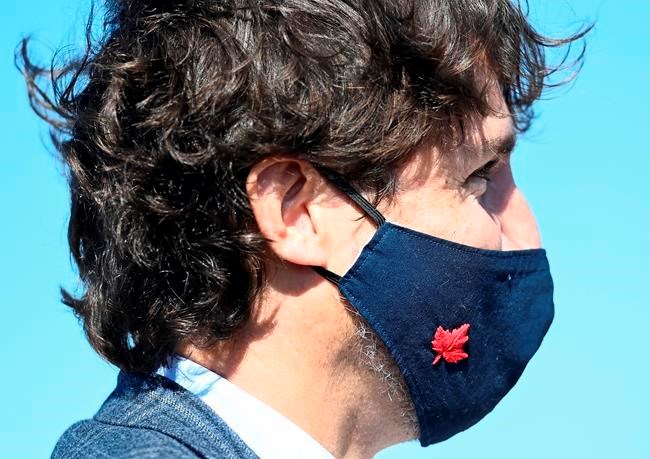OTTAWA — Prime Minister Justin Trudeau says the federal government began preparing for a possible pandemic as soon as it received the first alert about a mysterious cluster of pneumonia cases in China on New Year's Eve.
Trudeau is defending his government against accusations it didn't act fast enough to warn Canadians about the danger COVID-19 posed to their health and the economy.
This comes as U.S. President Donald Trump is accused of downplaying the danger of the novel coronavirus while privately telling journalist Bob Woodward in early February, during an interview for his book, he knew it was much worse than the flu.
"Every step of the way, we were informed by our experts as to how to keep Canadians safe — what needed to be done, what measures would be helpful in continuing to support Canadians as we were aware of this potential," Trudeau said Friday during a news conference in Gogama, Ont.
"But as people know, we were very much learning on the way as we responded."
A briefing note prepared in May for federal Health Minister Patty Hajdu says Canada got its first warning of a potential new virus on Dec. 31, 2019. That was when the Global Public Health Intelligence Network alerted the Public Health Agency of Canada of a mystifying cluster of pneumonia cases in Wuhan, China that appeared to be linked to a new virus.
Dr. Theresa Tam, the chief public health officer, met with her provincial counterparts two days later to update them and begin forming a Canadian response plan. Canada's first case — a man who had been in Wuhan —came Jan. 25. On Jan. 30, Canada warned against travel to China. Travellers coming from China were asked to isolate for two weeks after arriving.
Similar warnings were added for Iran and Italy in early March as the pandemic surged in those countries.
But Hajdu and Tam continued to tell Canadians the risk of getting COVID-19 in Canada was low until at least March 10. The border remained open until March 16, when all non-essential travellers except Americans were barred entry. The Canada-U.S. border restrictions were added March 21.
Until March 24, the majority of new COVID-19 cases in Canada were in people who had travelled outside the country.
Conservative health critic Michelle Rempel Garner said Friday that Hajdu should be fired for not doing more earlier. As of Friday, Canada has had 134,924 positive COVID-19 cases and 9,163 deaths.
"If action had been taken three months earlier, would things be different," said Rempel Garner. "Minister Hajdu has demonstrated dangerous incompetence. So why is she still in charge of Canadians' health and safety?"
Tam said the decisions were made as the information warranted. On March 10, when the message to Canadians was that the virus was not spreading in Canadian communities yet, about 80 people had tested positive, almost all of them people who had travelled. Six provinces had yet to confirm a single case.
Two weeks later, the number of domestic cases exceeded travel cases and every province had started to see them.
Tam said the information about the virus was changing rapidly, but the work in Canada was constant.
"Ever since we got information about the cluster of pneumonia in Wuhan, domestic preparedness already began to escalate," she said.
Lab testing was one of the first priorities, to ensure Canadian labs could actually test people for COVID-19. In February, she said, provinces and territories were warned "the window for preparedness was closing," Tam said.
But she said within Canada, the risk of local transmission was still very low and that was why that advice continued to be given until mid-March.
"As we've seen with this pandemic things change very rapidly, so very soon after (March 10) lots of public health measures evolved and escalated at every level of public health in Canada," she said.
On travel advice, Tam said the initial warnings pertained to countries with significant outbreaks but noted when the worldwide travel ban came March 16, it was the first time it had ever been done and before many nations had any cases.
"That was quite a significant move," she said. "We were not waiting for a country that hasn't announced any cases to provide that advice."
Tam and Trudeau also warned this week that it's up to Canadians whether there is a significant second wave of the virus, after cases continued to creep up.
The daily average case number over the previous week is now 618, up from 545 on Monday, and 435 on Aug. 31.
This report by The Canadian Press was first published Sept. 11, 2020.
Mia Rabson, The Canadian Press



